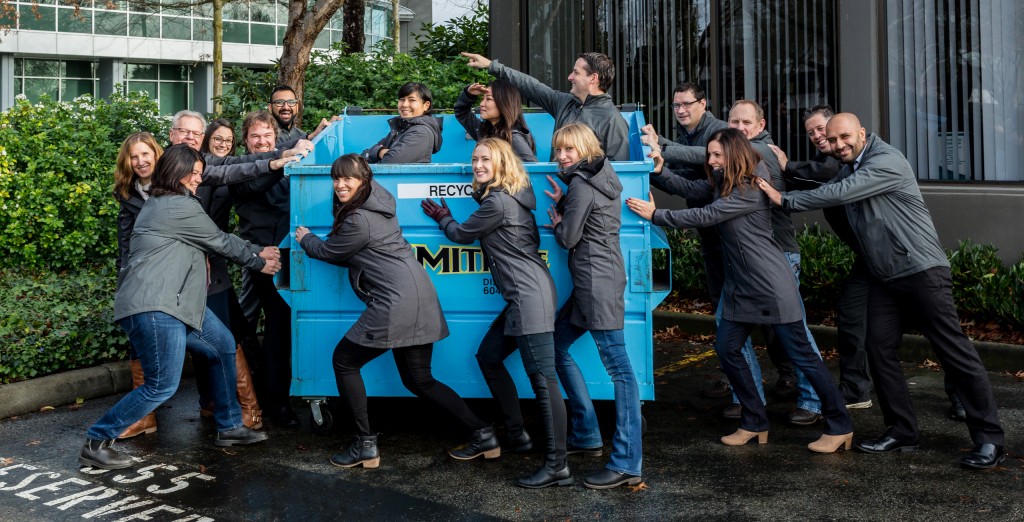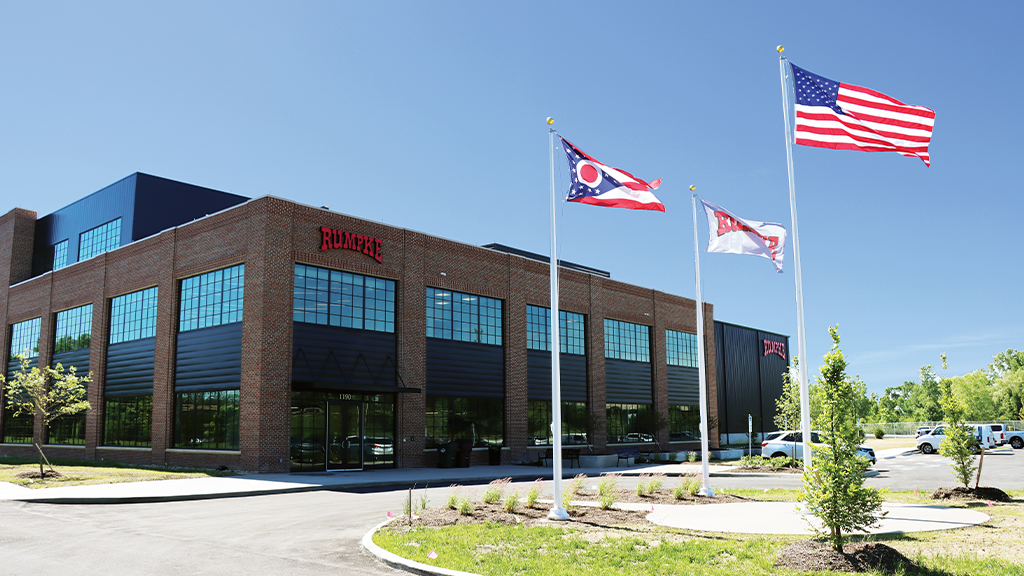A collective consult
Recyclesmart combines understanding of corporate culture and technology to fine-tune recycling processes for big waste generators

Development of a successful corporate climate for recycling can take time and energy, especially for large entities such as hotels and shopping centres. The need to shape a process for sustainable operations, from the office through maintenance to the process of emptying the bins, can be daunting. However, the potential for cost savings alongside successful environmental stewardship is often a big draw for management.
Outside consultants can be the answer for companies that need an extra set of eyes to get their recycling programs off the ground and keep them moving. For the team behind RecycleSmart, that was the starting point in their quest to provide better recycling programs and processes. Today, the company does just that, and has leveraged technology of various kinds to fine-tune recycling processes as well as keep costs down for customers across Canada.
RecycleSmart started out in 2008 when the husband and wife team of Colin Bell and Jaclyn McPhadden, who had been involved with the hospitality industry, saw the need for waste and recycling consulting in that sector.
"They were spending a lot of time working with larger hotels that were having waste problems," explains Graeme Dobinson, who became a managing partner along with Bell and McPhadden in 2013. "One of the things they found was that the hotels weren't doing a very good job of recycling at that time. They saw an opportunity on the cost side as well. They could see that the hotel industry needed help to be more efficient in the way they handled materials, what they were doing with those materials, how to get them off-site, and they needed help as well with the invoicing and appraising side of things."
When Dobinson joined the company, the need for this kind of service was obvious not only in the Vancouver area but across Canada. RecycleSmart pivoted into providing its services to large clients everywhere in the country, with a continued focus on companies in hospitality and retail.
A different kind of business
The way in which RecycleSmart operates is somewhat unique in the waste collection industry. The company does not provide bins or trucks, but instead is a go-between, working with local haulers and large corporate clients that generate waste, to provide efficiency wherever possible.
"Our business model is completely upside-down and backwards to a hauler," says Dobinson. "If you're a hauler, you pick up and charge by the bin - the more pickups they get, generally the more money they make. And they're incentivized to pick up bins as light as possible because each one has a cost at the landfill. The heavier the bin, the more the cost and the less money they make. We want clients to be efficient and want them to have less pickups."
He adds that the way they structure their fees is based on their ability to reduce costs and find efficiencies. "That's when RecycleSmart is able to pay for itself."
According to Dobinson, RecycleSmart goes deep into its client's corporate culture to find what needs changing and encourages it to happen. That requires plenty of on-site engagement, no matter what the facility being serviced might be.
"We work with the inside cleaners, for example," he says. "We might develop a certain style of inside recycling bins that the tenant uses, then we'll educate the cleaners so that when they pick those bins up they know where it needs to go, how it's collected, and then we'll do additional employee engagement."
He says if a company is not set up correctly internally, waste won't go into the right bins outside. If an employee at a desk only has a black garbage bin, that's where everything is going. "If you have a place where you can set up for collection of paper, tin, organics and so forth, all properly labelled, along with education, then it's going to be in the right bin inside," which he says means it will get to the right place outside.
Technology in play
Efficient use of outdoor bins is a big part of RecycleSmart's operations as well. The company targets greater use of bins, compactors and other collection tools - and has turned to technology to ensure these assets are being used to their highest potential.
RecycleSmart installs small sensors inside waste and recycling bins, which provide a unique amount of knowledge as to what is being collected on any given day.
"In the old days, if we wanted this information, you would essentially have to drive down to the location, take your clipboard out and look into the dumpster," he says. "When you're talking about national clients, it's not realistic to be able to drive to every bin across Canada. The sensors are a complete and total game changer for us."
Using bin sensors, a company can determine how full their bins are at any point in time, when and how they are picked up, how full the bins were at the time they were emptied, whether pickups were on schedule or missed, and other key pieces of data that can help evaluate the overall efficiency of the pickup operation.
"If a client called me today and said ‘how full is my bin, and how much do we owe?' I can tell them exactly the fullness of that bin, in real time," Dobinson says. "That information has really helped us with efficiencies."
Sensors can also be equipped with cameras for even more detail on the flow of material through bins.
"We have some systems that can take a physical picture inside the container, so not only can we determine how full it is, but we can find out what's going in it," he says. "I can see if there's cardboard or paper in the waste bin.
"It's really endless, the amount of information we can get, and with that we can go back to the client and say ‘if we do these things, based on the data we collected, we can get this result.'"
Technology does come with challenges, however, which requires some consideration, when it comes to things like maintaining the on-site sensors.
"It's not that easy to have sensors in a garbage bin that's constantly being tipped and dumped," he says. "They get smashed, fall off and get disconnected. We have field agents out doing repairs on them quite frequently."
Building for the future
With the information gathered by their sensors and by understanding the needs of their clients, RecycleSmart can effectively work as a go-between, communicating with local hauling companies on behalf of the client to ensure that they have the best possible fit for their needs. This can mean evaluating pickup days and times, number of bins on site, or any number of other small pieces of information that can mean savings for the client.
"Our clients are usually companies who want to do a better job and increase their diversion, but maybe don't have the internal resources to hire one or two people full-time to manage their program," Dobinson explains. "They see the value of outsourcing that to a team of experts. We also have the technology that they don't have, so they realize the benefits of giving everything to us, so we can manage everything on their behalf."
The concept that RecycleSmart has brought to industry is proving to be a good fit. The company has expanded rapidly over the past few years, including hiring some 25 people in the last 24 months, and appeared at #14 on the PROFIT 500 listing for 2017 (an award based on five-year revenue growth, published in the October edition of Maclean's magazine.)
Simplifying the waste and recycling process for clients is definitely striking a chord, according to Dobinson. The company's combination of technology and drive is leading to significant benefits for customers, including deep cuts to waste-related operating costs.
"The sensor technology is one thing, but the other pillar is helping clients with their waste reduction goals," he notes. "Usually, when we implement our full-service program, costs drop 20 to 30 percent within a couple of months."
Dobinson expects that the technology and methods used by RecycleSmart will continue to change and improve going forward, with application across the hauling management sector. In addition, regulations in various regions will help push growing needs for innovative waste reduction solutions.
"There are so many new regulations coming down," he says. "Our clients are very concerned about upcoming regulations and how they're going to be able to handle them internally."
He adds that the industry will increasingly be looking more closely at the way they purchase waste and recycling services. "The recycling industry is not going to get more simple; it will get more complex," he says.
"We get a lot of referrals from our clients because the experience is so much different than what they've had in the past - they're used to signing long-term, binding contracts with particular waste haulers."
For RecycleSmart, success has come through helping clients reduce their costs for managing waste, reducing their pickups and increasing efficiency. And it's about one more thing.
"We're very passionate about our business, and the employees we get are also passionate," says Dobinson. "Not only are we helping clients, but we're hopefully making a small difference in the world as well." RPN
This article was originally published in Recycling Product News, Volume 25, Number 8, November/December, 2017.
Company info
Suite 100-3751 Shell Rd.
Richmond, BC
CA, V6X 2W2
Website:
recycle-smart.ca
Phone number:
1.888.892.1796



